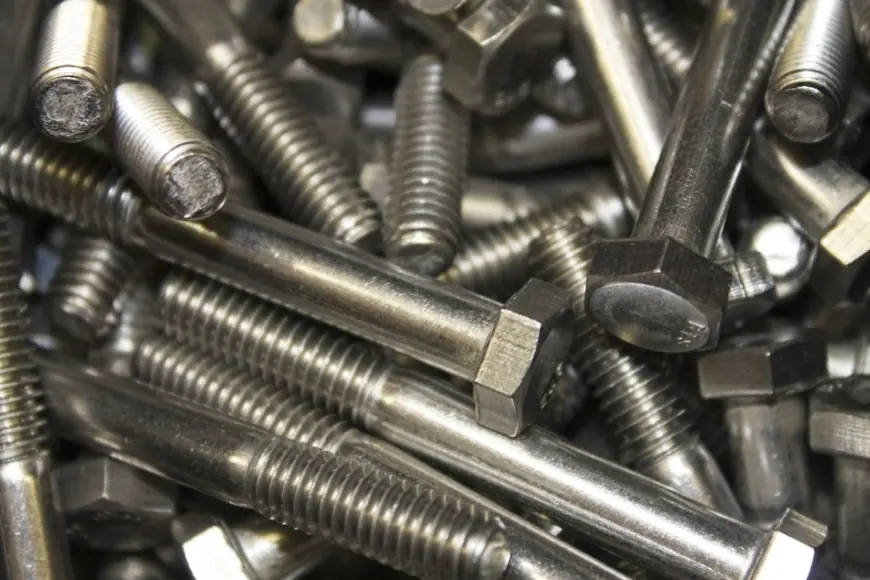304 Stainless Steel Fasteners – A Complete Guide
Find out everything about 304 stainless steel fasteners, including their features, benefits, and uses in construction, marine, and industrial applications.

Every industry relies on fasteners. They may be small, but they hold structures, machines, and equipment together. Choosing the right fastener material is critical for safety, durability, and performance. Among all materials, 304 stainless steel fasteners are one of the most widely used because they offer an excellent balance of strength, corrosion resistance, and affordability.
This guide explores SS 304 fasteners in detail—their composition, properties, types, benefits, and uses across industries.
Introduction to 304 Stainless Steel
304 stainless steel is part of the austenitic stainless steel family, also known as 18/8 stainless steel due to its chemical makeup:
-
18–20% chromium (gives corrosion resistance)
-
8–10.5% nickel (adds toughness and ductility)
-
Small amounts of carbon, manganese, and silicon
These elements combine to make 304 SS the most versatile and commonly used stainless steel grade.
Properties of 304 Stainless Steel Fasteners
Fasteners made from 304 stainless steel offer several key properties:
-
Corrosion Resistance
-
Performs well in humid and mildly corrosive environments.
-
Suitable for fresh water, chemicals, and urban conditions.
-
-
Mechanical Strength
-
Tensile strength: ~515 MPa.
-
Withstands heavy loads and mechanical stress.
-
-
Temperature Stability
-
Retains strength at sub-zero temperatures.
-
Can resist oxidation at high temperatures up to 870°C.
-
-
Non-Magnetic Nature
-
In annealed condition, SS 304 is non-magnetic.
-
-
Workability
-
Easy to machine, weld, and fabricate.
-
These qualities make SS 304 fasteners reliable for industries ranging from construction to food processing.
Types of 304 Stainless Steel Fasteners
Fasteners come in many forms, and 304 stainless steel is used to manufacture them all:
1. Bolts
-
Common types: hex bolts, carriage bolts, U-bolts, anchor bolts.
-
Found in construction, equipment assembly, and machinery.
2. Nuts
-
Includes hex nuts, lock nuts, and flange nuts.
-
Designed to pair with bolts for secure fastening.
3. Screws
-
Machine screws, wood screws, and self-tapping screws.
-
Widely used in furniture, electronics, and appliances.
4. Washers
-
Flat washers, spring washers, and fender washers.
-
Provide load distribution and prevent loosening.
5. Studs and Threaded Rods
-
Used in heavy-duty assemblies, pipelines, and structural applications.
6. Customized Fasteners
-
Tailor-made for aerospace, marine, and oil & gas industries.
Advantages of 304 Stainless Steel Fasteners
1. Corrosion Resistance
Resists rusting and staining in everyday environments, making it ideal for indoor and outdoor use.
2. Strength and Durability
Holds up well in demanding conditions without losing performance.
3. Cost-Effective
More affordable than higher grades like 316, offering great value for most applications.
4. Versatility
Available in many shapes and sizes for different industries.
5. Appearance
Polished surface looks appealing in visible or architectural applications.
Applications of 304 Stainless Steel Fasteners
Because of their balance of properties, SS 304 fasteners are found across multiple industries:
-
Construction and Architecture
-
Railings, facades, bridges, and roofing systems.
-
Provide strength and visual appeal.
-
-
Marine Industry
-
Used in shipbuilding, docks, and boat fittings.
-
Performs well in non-aggressive seawater conditions.
-
-
Food Processing Industry
-
Found in food handling equipment and storage units.
-
Hygienic and easy to clean.
-
-
Automotive and Aerospace
-
Used in engines, exhaust systems, and aircraft parts.
-
Provides durability under varying temperatures.
-
-
Chemical and Oil Industry
-
Employed in processing plants, pipelines, and offshore platforms.
-
-
Household Applications
-
Appliances, furniture, and kitchen fittings.
-
Comparison: 304 vs. 316 Stainless Steel Fasteners
Buyers often wonder whether to use 304 or 316 stainless steel fasteners.
| Factor | 304 Stainless Steel Fasteners | 316 Stainless Steel Fasteners |
|---|---|---|
| Composition | 18% Cr, 8% Ni | 16% Cr, 10% Ni, 2% Mo |
| Corrosion Resistance | Excellent | Superior, especially in chlorides |
| Cost | More affordable | More expensive |
| Best Use | General industry, construction, indoor/outdoor | Harsh marine, chemical, or coastal environments |
Conclusion: Choose 304 SS fasteners for general applications. Select 316 SS fasteners for aggressive, chloride-rich environments.
Maintenance Tips for 304 Stainless Steel Fasteners
While they are corrosion-resistant, proper care extends their lifespan:
-
Clean fasteners regularly to remove dust, salt, or chemicals.
-
Avoid direct contact with dissimilar metals in wet environments.
-
Inspect periodically for wear, especially in outdoor conditions.
-
Use protective coatings in harsh environments for added safety.
Why Choose 304 Stainless Steel Fasteners?
-
They provide reliability and strength.
-
They are cost-effective compared to higher-grade alloys.
-
They are widely available in standard and custom designs.
-
They offer a balance of durability, aesthetics, and performance.
For industries that need long-lasting fastening solutions, 304 stainless steel fasteners are the most practical choice.
Final Words
304 stainless steel fasteners are among the most widely used fasteners in the world. Their corrosion resistance, strength, and affordability make them suitable for industries like construction, marine, automotive, chemical, and food processing. While higher grades like 316 may perform better in aggressive environments, 304 remains the preferred choice for most applications.
If you need reliable, durable, and cost-effective fasteners, stainless steel 304 fasteners are the ideal solution.
What's Your Reaction?
 Like
0
Like
0
 Dislike
0
Dislike
0
 Love
0
Love
0
 Funny
0
Funny
0
 Angry
0
Angry
0
 Sad
0
Sad
0
 Wow
0
Wow
0


















































